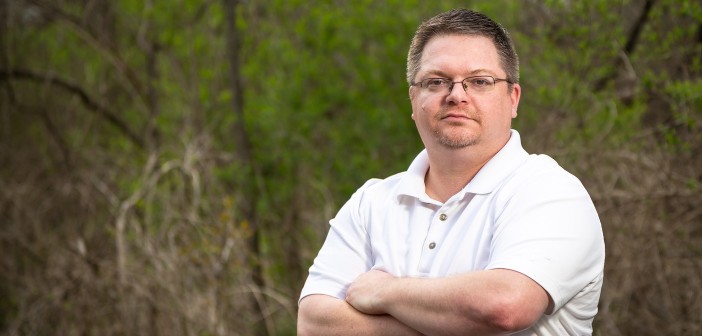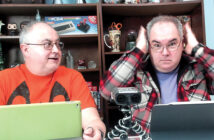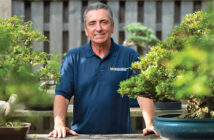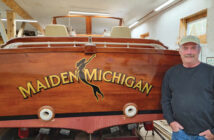Before he began writing a series of Post-Apocalyptic and Science Fiction novels, Boyd Craven, III worked factory jobs and for Flint River Farm. He has now self-published over 30 works including two series, The World Burns and Anonymous Justice, available as eBooks, in print and also on audio. His novels aim to entertain while also informing readers about prepping and survival techniques. Craven currently lives in Grand Blanc with his wife and four kids. He prefers not to have an address on his home and has begun practicing living “off the grid,” something he plans to pursue further when his children are all grown.
In high school, the Linden native almost failed English because he wasn’t interested in learning about structure and grammar; but, he read everything he could get his hands on, beginning with his favorite author, Stephen King. Craven wrote creatively in his spare time. “I began secretly writing historical western romance/mail-order bride novels under a female pen name until the day my post-apocalyptic novels started getting attention,” he explains.
Today, Craven makes a living from writing novels and through his involvement in the Prepper/Survivalist community. In April, he was part of “PrepperCon: The Nation’s Most Exciting Survival & Preparedness Expo,” which was held in Utah. At the event, Craven was part of a presentation titled, “Authors of the Apocalypse,” which was a discussion of prepping and survival in fiction. The group of authors included: Annie Berdel, Kate Morris, A.R. Shaw and Chris Weatherman – also known as A. American (“Angery American”) and author of The Survivalist series.
To Craven, prepping is based on the simple idea of being more self-reliant and putting away for hard times. “It doesn’t have to be an end-of-the-world event,” he says. “If you lose your job, which has happened to everyone, I assume, what if you didn’t have to worry about buying food?” He learned this through personal experience after losing a job. “We didn’t have to dig very deep to make it through hard times,” he says, because he has food and supplies set aside, as well as basic survival knowledge of hunting, fishing and farming. But if a large event happened, like Hurricane Katrina as an example, “Look how long it took for people to get help,” he adds.
Much of the skills detailed in his novels he learned while camping as a kid and in the Boy Scouts. “Prepper authors are trying to teach something as we entertain, anything from how to start a fire and store food, to putting away for hard times,” Craven states. The survival techniques he works into his fiction include things like how to make a stove from a coffee can, or in more extreme situations, such as if disaster struck a large city, how to trap game and live on whatever food sources are available. The methods of survival Craven didn’t learn camping in his youth he picked up by following his own unending curiosity. What he learns about prepping and survival is acted out by the characters in his books.
Craven keeps up with current events, because they are a part of his stories and also fuel trends in the post-apocalyptic fiction genre. For example, he and other “Writers of the Apocalypse” used to be more concerned about things like surviving an EMP (Electromagnetic Pulse), which has been the topic of many post-apocalyptic stories. But now, he is more concerned with civil unrest.
“Sometimes, the civil unrest of the country and my novels have become eerily similar,” Craven insists. He and his father, who co-write political thrillers, had to stop working on the series because it was getting too close to reality. “The political thriller series was meant to be a farce,” he shares. “Dad said, ‘let’s take the extreme left and the extreme right and put them in a situation and see what happens,’ but it began to follow real life.” For example, when they were preparing to publish the first book, Breaking Point, the tragic shooting in San Bernardino happened, so they had to change the book because it included a very similar scene. Then, when the third book, DC Riots, was set to publish, the Chicago riots were going on. “It was supposed to be a spoof and we had to take a break because the subject matter got too dark,” he says.
For those interested in basic prepping, Craven suggests they start by becoming educated with a focus on knowledge of basic needs. “Prepping and survival techniques are not common knowledge,” he states. Craven also suggests that at all times, people have on hand what is required to meet their basic needs: food, medicine and shelter. “If you know how to grow food, how to hunt, and have some food saved away,” Craven says, “then, you’ll be in a better place if a disaster does happen.”








